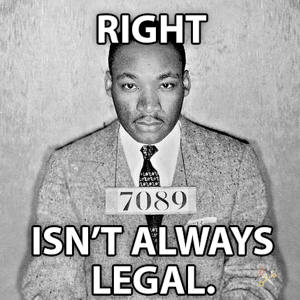Summa of the Libertarian Catholic
Our purpose in life is to be saints, promoting a civilization of truth and love (pro veritatis amorisque humanitate) but we understand that virtue cannot be forced—all moral action requires free will. As such, we hold that government must be restricted to its only legitimate role of protecting the natural rights to life, liberty, and property of its citizens. We are called to be free and to love and both require each other. There is no love without freedom and no freedom without love.

Popes have consistently denounced the concept of socialist governments and to complement that, we’d like to provide a primer for the defense of libertarianism and Catholicism in the form of St. Thomas Aquinas’s Summa Theologea to hopefully answer all the doubts one may have about the libertarian Catholic system.
Article 1: Whether libertarianism is compatible with Catholicism.
Objection 1: It would seem that it is the role of the Church to convert people and that government is a legitimate means to that end, therefore, libertarian principles of limiting government to defense of Natural Rights works against the Great Commission.
Objection 2: There’s a world of difference between “the tax burden should be reduced in order to promote economic growth” and the libertarian, “taxation is theft.” There’s room for the former in Catholicism but not the latter.
On the contrary: The Catechism states, “The diversity of political regimes is morally acceptable, provided they serve the legitimate good of the communities that adopt them.”
I answer that: The Catholic Church does not endorse or exclude one political ideology over the other. Her only goal is in the benefit of mankind. The Catechism states that regimes must be in concordance with “…the natural law, to the public order, and to the fundamental rights of persons…” As we’ll see here, libertarianism may be the only political system that actually satisfies all of these requirements.
Answer to Objection 1: We are indeed tasked with spreading the Gospel, but the problem when involving government is that one cannot force another to profess Christ. As Fulton Sheen wrote, “Our Lord on the Cross, in the face of the enemies of religion did not smite them dead, but prayed for them, for they knew not what they did. He left man free to be irreligious….” Belief is a result of the grace of God and of free will. Just as God gave us the freedom to sin, so must the temporal governments.
Answer to Objection 2: Allowing government any authority outside its natural bounds of protecting against infringements of Natural Rights is a recipe for disaster. As Lord Acton said, “Power corrupts and absolute power corrupts absolutely.” Government must be held to its legitimate role and nothing else lest we inevitably devolve into tyranny.
Article 2: Whether libertarianism is rooted in selfish greed.
Objection 1: Libertarianism is based in the erroneous principle of autonomy, which manifests itself in selfish greed. It is of the philosophical tradition of anti-Christian thinkers like Machiavelli, Nietzsche, and Rand.
On the contrary: St. Paul said, “It was for freedom that Christ set us free.”
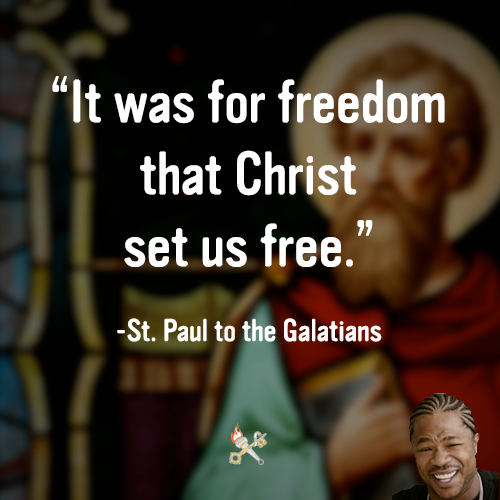
I answer that: Libertarianism, which boils down to the non-aggression principle (NAP: The initiation of physical force against persons or property, the threat of such, or fraud upon persons or their property is inherently illegitimate) is derived from the Catholic Scholastics, most notably the School of Salamanca, who based their proto-Austrian economic theory on Natural Rights derived from Scripture and Catholic theology. Thinkers like Francisco de Vitoria, Domingo de Soto, and Francisco Suárez originated the modern concepts of libertarianism based on Catholic moral teaching and St. Thomas Aquinas’s theory of natural law, which stipulates the principle, “one should do harm to no man” (Summa Theologea I-II Q. 95), a progression from the Golden Rule, professed in the Bible: “Do to others as you would have them do to you.” Lk 6:31
Article 3: Whether government promotes the common good.
Objection 1: Libertarianism cannot be correct because the point of life isn’t freedom from harm, it is to do good. Just as man’s purpose is not simply to avoid evil but to do good, it is the purpose of government to make men better by inculcating them with virtue.
Objection 2: It would seem that government is necessary to promote the common good as Pope Pius XII wrote in Summi Pontificatus, “it is the noble prerogative and function of the State to control, aid and direct the private and individual activities of national life that they converge harmoniously towards the common good.”
On the contrary: St. Thomas Aquinas states, “Human government is derived from the Divine government, and should imitate it. Now although God is all-powerful and supremely good, nevertheless He allows certain evils to take place in the universe, which He might prevent, lest, without them, greater goods might be forfeited, or greater evils ensue” (ST II-II Q. 10)
I answer that: The absolute minimum for civilized society is the acceptance of Vulnero Nemo (harm no one) and the only legitimate purpose of government is to enforce this principle. In other words, the only legitimate role of government is to protect its citizens from harm to their negative rights. Whenever government steps outside its natural bounds it necessarily works against the common good.
Answer to Objection 1: It’s true that freedom from harm isn’t the purpose of life. We are called to do more than just not harm people. We’re called to do good and be proactive in love, but that’s not the domain of the government. Once the government attempts to assert positive rights or initiates preemptive war or stops victimless crimes, it is using illegitimate force. One cannot force another to be good and when one attempts that they do evil in order to promote good, it’s a contradiction. In the Summa, Aquinas says:
Now human law is framed for a number of human beings, the majority of whom are not perfect in virtue. Wherefore human laws do not forbid all vices, from which the virtuous abstain, but only the more grievous vices, from which it is possible for the majority to abstain; and chiefly those that are to the hurt of others, without the prohibition of which human society could not be maintained: thus human law prohibits murder, theft and such like. (ST II-I Q. 96)
Aquinas later elaborates, “…in human government also, those who are in authority, rightly tolerate certain evils, lest certain goods be lost, or certain greater evils be incurred: thus Augustine says (De Ordine ii, 4): “If you do away with harlots, the world will be convulsed with lust.” Hence, though unbelievers sin in their rites, they may be tolerated, either on account of some good that ensues therefrom, or because of some evil avoided.” (ST II-II Q. 10)
To force the Church’s moral theology on people takes away free will and negates any possibility for a moral choice in the matter. God gave us free will; he intended us to use it.

Answer to Objection 2: Government should be ordered toward the common good but whenever it steps outside of its only legitimate role of protecting against the infringement of negative rights, it necessarily does harm to the common good. The more government seeks to help people through its bureaucratic coercion, the more it harms those very people. We see this everywhere it’s tried from East Germany (in contrast with West Germany), North Korea (in contrast with South Korea), Venezuela and to a lesser extent in US cities. The bureaucrat’s intent may be right in promoting positive rights toward the common good, but it has the opposite effect. Pope Pius XII even acknowledges the tendency for governments to ruin economies to the detriment of the common good immediately after his call for government interference:
To consider the State as something ultimate to which everything else should be subordinated and directed, cannot fail to harm the true and lasting prosperity of nations. This can happen either when unrestricted dominion comes to be conferred on the State as having a mandate from the nation, people, or even a social order, or when the State arrogates such dominion to itself as absolute master, despotically, without any mandate whatsoever. If, in fact, the State lays claim to and directs private enterprises, these, ruled as they are by delicate and complicated internal principles which guarantee and assure the realization of their special aims, may be damaged to the detriment of the public good, by being wrenched from their natural surroundings, that is, from responsible private action. – Summi Pontificatus 60
Article 4: Whether government is necessary to help the poor.
Objection 1: As Cardinal Oscar Rodriguez Maradiaga said, “Libertarian deregulation is much to the disadvantage of the poor.” The best way to help the poor is through governmental regulation.
Objection 2: In Casti Connubii, Pius XI clearly delineates the state as enforcer of more than negative rights but in fact the state in justice must ensure the material well being of the family: “Wherefore, those who have the care of the State and of the public good cannot neglect the needs of married people and their families, without bringing great harm upon the State and on the common welfare. Hence, in making the laws and in disposing of public funds they must do their utmost to relieve the needs of the poor, considering such a task as one of the most important of their administrative duties.”
On the contrary: Fulton Sheen said, “Our blessed Lord recommended to the rich young man that he sell all he had and give to the poor, but He did not take away the young man’s property by force.” Jesus said, “…sell what you own, and give the money to the poor, and you will have treasure in heaven;” he didn’t say vote for politicians to take other people’s money to give to the poor.
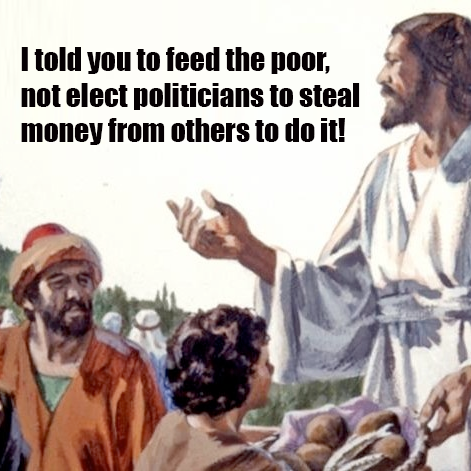
I answer that: The single most important factor in alleviating the distress of the impoverished is not charity or government aid, but the free market under the rule of law.
Answer to Objection 1: Cardinal Maradiaga suffers from the “Who will build the roads” economic fallacy in which he thinks that since governments provide aid to the poor and redistribute wealth that government is the only entity who can do such things.
First, as a Church official, he should know better that private institutions are much more efficient and effective at helping the poor than government. Charities really help people but government programs tend to perpetuate the problems that are set out to fix. Second, no economic system in the history of the Earth has been better at redistributing wealth from those who have to those in need than the free-market. Billions of people making exponentially more decisions will always be better at allocating wealth than a handful of central planners.
And this shows in real-world experience. The free-market system, based in libertarian principles, has led to the greatest increase of wealth the world has ever seen and the free-market has raised more people out of poverty than any other economic system in the history of mankind.
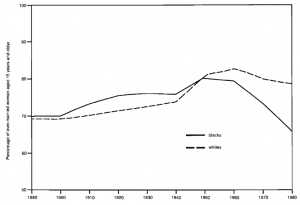
Answer to Objection 2: If the goal is to protect and encourage the family, nothing is worse than government welfare. In a study published in Focus, Erol Ricketts found that black families had higher marriage rates than white counterparts from 1890-1950 in the United States, dispelling the theory that the lasting effects of slavery led to high single-motherhood among blacks. What caused the shift was the perverse incentives brought about by Great Society social welfare programs. As is usually the case, whenever government tries to help people by overstepping its legitimate role, it actually harmed them.
Article 5: Whether one can be coerced into being good
Objection 1: It would seem that it is our duty to force people to be good. If people aren’t willingly being good Christians, we must force them to be.
On the contrary: A good act is amoral if it is coerced.
I answer that: If someone puts a gun to your head and tells you to give a homeless person a dollar, have you done a moral good? No. Similarly, if the government taxes you by threat of violence and uses that money for some supposed good, you are likewise not doing a good or moral act. The same is true for the converse—taking someone else’s money and giving it to the poor is not a moral act. There is no benevolence in giving away someone else’s money. Similarly, one cannot force someone to think charitable thoughts or love their neighbor or God. Government’s role ends at preventing harm to one’s negative rights, not promoting good.

Force is only legitimate in response or prevention of equal amount of force. One can legitimately use force to prevent harm from being done (or in retribution from harm), but one cannot legitimately use force to promote a good, such as being loving or charitable or inventive. In order for one to be good, one must first will it, and one cannot will the good if one is being coerced into doing it by the state.
A secondary result of government coercion to promote good is the moral hazard that ensues from a dependent populace. As government scope increases, personal responsibility decreases.
Article 6: Whether all authority is from God.
Objection 1: But it would seem that all government is instituted by God as St. Paul says, “Let every person be subject to the governing authorities; for there is no authority except from God, and those authorities that exist have been instituted by God.” (Rom 13:1)
On the contrary: St. Paul clarifies, “…For rulers are not a cause of fear for good behavior, but for evil.”
I answer that: St. Paul is not claiming that all government is instituted by God for that would carry the troubling implication that Napoleon, Hitler, and Stalin were instituted by God. He is only referring to just authority as he later clarifies “…For rulers are not a cause of fear for good behavior, but for evil.” Napoleon, Hitler, and Stalin caused fear for good behavior and thus were not included in St. Paul’s definition of ruler. Peter has similar criteria for the authority which we must accept: “For the Lord’s sake accept the authority of every human institution, whether of the emperor as supreme, or of governors, as sent by him to punish those who do wrong and to praise those who do right.” (Peter 2:13-14)
As the Catechism states: “Authority does not derive its moral legitimacy from itself. It must not behave in a despotic manner, but must act for the common good as a ‘moral force based on freedom and a sense of responsibility.” (CCC 1902)
Reply to Objection 1: Saint Chrysostom explains in his Homily 23 on Romans that St. Paul was referring to rulers in general, not every specific ruler. “Thus when a certain wise man says, ‘It is by the Lord that a man is matched with a woman’ he means this, God made marriage, and not that it is He that joins together every man that comes to be with a woman.” Similarly, God made the institution of government; he did not institute every wicked governor.
Article 7: Whether we must obey the government unconditionally.
Objection 1: It would seem that we must obey our government unconditionally as St. Paul says, “therefore he who resists the authorities resists what God has appointed, and those who resist will incur judgment.”
On the contrary: The Catechism clarifies that, “Authority is exercised legitimately only when it seeks the common good of the group concerned and if it employs morally licit means to attain it. If rulers were to enact unjust laws or take measures contrary to the moral order, such arrangements would not be binding in conscience. In such a case, “authority breaks down completely and results in shameful abuse.” (CCC 1903)
I answer that: While authority may be appointed by God, right reason demands that only legitimate authority—that is authority that is just—should be obeyed. The Catechism states, “The citizen is obliged in conscience not to follow the directives of civil authorities when they are contrary to the demands of the moral order, to the fundamental rights of persons or the teachings of the Gospel. Refusing obedience to civil authorities, when their demands are contrary to those of an upright conscience, finds its justification in the distinction between serving God and serving the political community. “Render therefore to Caesar the things that are Caesar’s, and to God the things that are God’s.” “We must obey God rather than men.” (CCC 2242)
Dr. Martin Luther King Jr. wrote in his letter from a Birmingham jail, “One has not only a legal but a moral responsibility to obey just laws. Conversely, one has a moral responsibility to disobey unjust laws.” As Augustine wrote, “An unjust law is no law at all,” similarly, an unjust government is no government at all. We have the moral obligation to disobey unjust rulers. Right isn’t always legal and legal isn’t always right. As St. Paul writes, “All things are lawful; but not all things are expedient. All things are lawful; but not all things edify.” (1 Corinthians 10:23)
Article 8: Whether humans have rights.
Objection 1: It would seem that the notion of rights is a modern invention devised to draw away from the goal of the common good. Humans do not have rights.
On the contrary: St. Thomas Aquinas says, “…justice has its own special proper object over and above the other virtues, and this object is called the just, which is the same as ‘right.'” (ST II-II Q. 57)
I answer that: Thomas Jefferson was correct when he wrote that we are “endowed by [our] Creator with certain unalienable Rights, that among these are Life, Liberty and the pursuit of Happiness.” And we have these rights whether our sovereigns acknowledge them or not. As Aquinas states, “Now a thing can be adjusted to a man in two ways: first by its very nature, as when a man gives so much that he may receive equal value in return, and this is called ‘natural right.’ This is contrasted with ‘positive right’ which is decreed by the prince or sovereign.” No one can take away your natural rights but they can do great damage making you think they can.
Article 9: Whether government should tax its citizens.
Objection 1: The Catechism states, “Submission to authority and co-responsibility for the common good make it morally obligatory to pay taxes…” (CCC 2240) so governments have the authority to tax its citizens for the greater good.
Objection 2: St. Paul states, “This is why you also pay taxes, for the authorities are ministers of God, devoting themselves to this very thing.” (Romans 13:5-7) Since authorities are ministers of God, we have the obligation to follow their order.
Objection 3: Even Jesus said to “Render to Caesar the things that are Caesar’s, and to God the things that are God’s.” And what’s on the dollar bill? It’s The United States Federal Reserve Note—it belongs to them.
On the contrary: God said through Moses the Seventh Commandment, “Thou shall not steal,” and St. Augustine declared, “An unjust law is no law at all.”
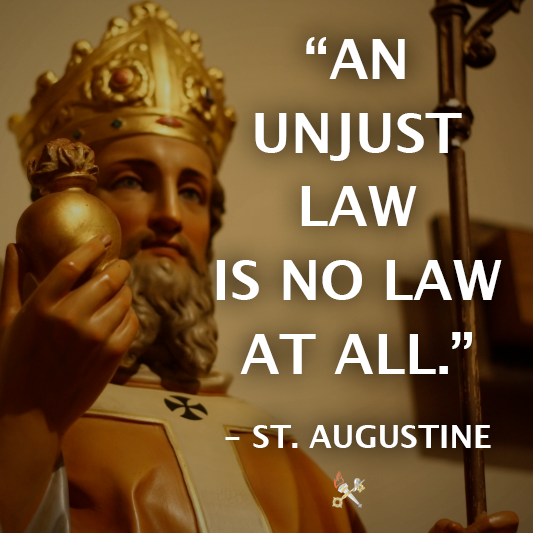
I answer that: Theft is proscribed in the Ten Commandments as one of the central foundations of Christianity. And an act which is evil if committed by an individual doesn’t suddenly become good when a group of people do it. A thug who takes money from you isn’t moral just because a majority of the community voted for him to take money from you or because he gives some of the money to hungry kids. Theft is theft no matter who commits the act. Augustine knew that governments are thieves as he asked, “…what are kingdoms but great robberies? For what are robberies themselves, but little kingdoms?”
Reply to Objection 1: Just as it is a moral obligation to follow the laws of your community (as long as you’re not sinning or cooperating with evil) for the sake of order, it is a moral obligation to pay taxes despite the fact that it is theft. I liken taxes to a financial slap on my cheek. “But I say to you, do not resist an evil person; but whoever slaps you on your right cheek, turn the other to him also.” (Mt. 5:39) The Catechism also says “any form of unjustly taking and keeping the property of others is against the seventh commandment” (CCC 2409) but that begs the question at hand: is taxation just? Since taxation is the involuntary taking of wealth, it cannot be just. The Catechism also says that it is a moral obligation to pay taxes, but an act can’t be moral if it isn’t a free choice—free of coercion by threat of violence or death as in taxation. Thus, CCC 2240 must only apply to just taxation—voluntary taxation—which doesn’t exist, at least in the United States government.
Reply to Objection 2: The problem here is taking a quote out of the Bible without using reason or considering context in order to justify an ideology. One could justify every single vile act in humanity doing that. After all, Paul says to the Ephesians, “Slaves, obey your earthly masters with fear and trembling.” Does that mean that slavery is justified? No, just as slavery was accepted as the norm in Paul’s time, taxes are accepted now. That doesn’t make them just.
Reply to Objection 3: “Render unto Caesar” has become a cliche used to justify taxation, but the argument doesn’t explicitly defend taxation. The Pharisees were trying to trap Jesus when they asked Him if they should pay taxes, forcing Him to either endorse Roman taxation and thus cause him to lose support and be considered a collaborator or a traitor, or explicitly rebuke the Roman authority and therefore setting him up for punishment for sedition. Instead, he called them out, “Why are you trying to trap me?” and outsmarted them by an answer that was intentionally ambiguous, putting the question back on them. “Render unto Caesar” begs the question of what is rightly Caesar’s. Of course, the question could rightly be answered that Caesar owns the money so give it back to him. Likewise, the Federal Reserve owns the US dollar, so give it back to them. But do they own your time or life? Do they own your property or even a percentage of it? No. Let them have their currency and let us keep the property that is rightfully ours.
Article 10: Whether socialism is compatible with Catholicism.
Objection 1: Socialism is a “system of social organization that advocates the vesting of the ownership and control of the means of production and distribution, of capital, land, etc., in the community as a whole”. This seems to be the best way to ensure that social and fiscal justice are maintained.
Objection 2: It would seem that if a society is to operate efficiently, it should be controlled by a centralized authority.
On the contrary: St. Pope John Paul II said, “The historical experience of socialist countries has sadly demonstrated that collectivism does not do away with alienation but rather increases it, adding to it a lack of basic necessities and economic inefficiency.”
I answer that: While centralized authority may seem like an easy way to fix the problems of society, socialism is not compatible with Catholicism because it necessitate coercion and a violation of free will and does nothing to further the prosperity of the people under its grip.

Reply to Objection 1: It’s comforting to think of an entire community owning something, but experience has shown us that this economic model is unsustainable and leads to economic ruin as we saw over a century in the Soviet Union or over a couple years in Venezuela. As Pope Leo XIII wrote in Rerum Novarum, “it is clear that the main tenet of socialism, community of goods, must be utterly rejected, since it only injures those whom it would seem meant to benefit, is directly contrary to the natural rights of mankind, and would introduce confusion and disorder into the commonweal. The first and most fundamental principle, therefore, if one would undertake to alleviate the condition of the masses, must be the inviolability of private property.”

Reply to Objection 2: While St. Paul lauds authority, it’s clear that abuse of authority can lead to tyranny and, as stated in the Catechism (CCC 1883), “Excessive intervention by the state can threaten personal freedom and initiative.” The alternative to a top down hierarchy is the autarchic system of subsidiarity, according to which “a community of a higher order should not interfere in the internal life of a community of a lower order, depriving the latter of its functions, but rather should support it in case of need and help to co- ordinate its activity with the activities of the rest of society, always with a view to the common good.”
The principle of subsidiarity is opposed to all forms of collectivism. It sets limits for state intervention. It aims at harmonizing the relationships between individuals and societies. It tends toward the establishment of true international order.
Article 11: Whether Catholicism is compatible with libertarianism.
Objection 1: It would seem that a libertarian cannot be a Catholic since the Catholic Church has long been the source of hierarchy, monarchy, and persecution, and so libertarians cannot support it in good conscience.
Objection 2: Libertarians support the separation of church and state and thus cannot be affiliated with it in any official capacity.
On the contrary: For a free society to thrive, it must be founded on morals.
I answer that: Libertarianism is not a condition of no rule (anarchy), but rather of self-rule (autarchy). Self-rule is based in personal responsibility and there must be some grounds for that personal responsibility. The Church serves as the best grounds for that personal responsibility. While a legitimate government does not enforce all morality, its legitimate role is to enforce basic common morality by protecting negative rights of citizens.

Reply to Objection 1: The Church has ceased serving in a political capacity and no longer persecutes heretics or infidels.
Reply to Objection 2: The Church and its practitioners are beginning to be persecuted by the secular state, and so they see the value in limiting the scope of government. The only way to live a virtuous and productive life these days is to get government out of the way.
Article 12: Whether libertarianism can be distinguished from modern liberalism and libertinism.
Objection 1: It would seem that libertarianism is the descendant of Enlightenment liberalism, which holds that liberty is the highest end and that individuals should be able to do as they see fit regardless of moral dictates.
Objection 2: Libertarians promote personal freedom to include drug use, sexual license, self-mutilation, suicide, and abortion, which the Church flatly condemns.
On the contrary: Libertarianism amounts to no more than the Non-Aggression Principle (NAP) and does not promote any positive behavior one way or another.
I answer that: Libertarianism is based in negative freedoms, that is, freedom from harm to life, liberty, and property. It does not subscribe to any positive freedoms, that is, freedom to do anything positively. As such, libertarianism does not promote any of the libertinism that the Church views as sinful.
Reply to Objection 1: A common misconception is that libertarianism is the spawn of the Enlightenment and descendant of the Jacobin Reign of Terror. But the Enlightenment had two strains, Lockean, which led to classical liberalism/libertarianism and Rousseauean, which lead to all the communist disasters of the 20th century and modern neoliberalism. Only the Lockean strain held true to the philosophy of the Scholastics with regard to negative rights and Natural Law.
Reply to Objection 2: Classical liberalism was built on the same negative freedoms as libertarianism. Liberalism has since strayed from that foundation to include many positive freedoms such as healthcare, employment, and service. This has meant that modern liberalism is actually opposed to classical liberalism and libertarianism in that government forces its citizens to pay for and supply the services and goods that comprise the positive freedoms.
Article 13: Whether we have a right to private property.
Objection 1: It would seem that we do not have a right to property as Pope St. Gregory the Great wrote, “For, when we administer necessaries of any kind to the indigent, we do not bestow our own, but render them what is theirs; we rather pay a debt of justice than accomplish works of mercy.” (Pastoral Rule Book III, Ch. 21)
Objection 2: It would seem that we do not have a right to property because the Seventh Commandment is about stealing people (kidnapping), not inanimate objects.
On the contrary: Though we have the duty to help others in need, we maintain a right to private property. As Pope Leo XIII wrote, “The first and most fundamental principle, therefore, if one would undertake to alleviate the condition of the masses, must be the inviolability of private property.”
I answer that: The right to private property is essential to a stable and prosperous society and the Catechism acknowledges this: “The right to private property, acquired or received in a just way, does not do away with the original gift of the earth to the whole of mankind. The universal destination of goods remains primordial, even if the promotion of the common good requires respect for the right to private property and its exercise.” (CCC 2403) We also have a duty to help others in need but this duty cannot be measured by man and that’s a clue it’s not the same type of right. A poor man is not justified in taking what the rich man has by force and if denied then killing the rich man.
Reply to Objection 1: While St. Gregory’s view may motivate some to do the right thing, it’s not technically correct as Pope Leo XIII says, “[asmgiving] is a duty, not of justice (save in extreme cases), but of Christian charity – a duty not enforced by human law.” (Rerum Novarum) Positive rights are of the divine economy. We must let God judge whether someone helped his neighbor or not and leave government out of it. As Chrysostom said, “Should we require soldiers to come and seize the rich person’s gold and distribute it among his destitute neighbors? Equality imposed by force would achieve nothing and do much harm.” (On Living Simply)
Reply to Objection 2: While the Seventh Commandment may very well be limited to extreme cases of theft (including theft of people), it still implies that it is wrong to violate one’s right to private property.
Article 14: Whether we should share all property in common.
Objection 1: It would seem that we should share all property in common as the first Christians did. “All the believers were together and had everything in common. Selling their possessions and goods, they shared with anyone who was in need.” (Acts 2:44-5)
On the contrary: Saint Paul writes that “Each of you should give what you have decided in your heart to give, not reluctantly or under compulsion, for God loves a cheerful giver.” (2 Corinthians 9:7)
I answer that: Any economic system works when only saints are involved. Sure, there is no property in Heaven, but as George Bailey said in It’s a Wonderful Life, “Well, it comes pretty handy down here, bud!” Saints can share everything in common because there is no sinful waste or covetousness. When sinners are involved, property must be maintained as a safeguard against sin.
Reply to Objection 1: Saint Paul set the example of how even Apostles should live. “I have coveted no one’s silver or gold or clothes. You yourselves know that these hands ministered to my own needs and to the men who were with me. In everything I showed you that by working hard in this manner you must help the weak and remember the words of the Lord Jesus, that He Himself said, ‘It is more blessed to give than to receive…” (Acts 20:33-35) and “…nor did we eat anyone’s bread without paying for it, but with labor and hardship we kept working night and day so that we would not be a burden to any of you; not because we do not have the right to this, but in order to offer ourselves as a model for you, so that you would follow our example.” (2 Thessalonians 3:8–9).
Article 15: Whether Christ saw wealth itself as sinful.
Objection 1: It would seem that all wealth is sinful as Christ said, “And again I say unto you, It is easier for a camel to go through a needle’s eye, than for a rich man to enter into the kingdom of God.” (Mt 19:24)
Objection 2: It would seem that all wealth is sinful as Christ said, “If thou wouldest be perfect, go, sell that which thou hast, and give to the poor, and thou shalt have treasure in heaven: and come, follow me.” (Mt 19:21)
Objection 3: It would seem that all wealth is sinful because Christ said that money is the root of all evil.
On the contrary: Saint Paul writes that “Each of you should give what you have decided in your heart to give, not reluctantly or under compulsion, for God loves a cheerful giver.” (2 Corinthians 9:7)
I answer that: Sure, there is no property in Heaven, but as George Bailey said in “It’s a Wonderful Life”, it “comes in pretty handy down here, Bub.” Wealth, or private property, is essential for a functioning economy. Any economic system works when only saints are involved but only free market capitalism works when sinners are involved. Unfortunately, that’s what we have on Earth. The Plymouth Pilgrims attempted to create a society without private property but found that it only led to poverty and nearly killed them all. After allowing for private wealth, they were saved, as William Bradford wrote, “The failure of this experiment of communal service, which was tried for several years, and by good and honest men proves the emptiness of the theory of Plato and other ancients, applauded by some of later times, — that the taking away of private property, and the possession of it in community, by a commonwealth, would make a state happy and flourishing; as if they were wiser than God.” (On Plymouth Plantation).
Reply to Objection 1: Some claim that the “Eye of a Needle” is an entryway into Jerusalem that is low so that a camel must lower himself to enter through it. This would mean that Christ isn’t saying it’s impossible for rich people to enter heaven, but rather that wealthy people must humble themselves in order to do so. It is more difficult to be humble when you are wealthy, but not impossible.
Reply to Objection 2: This instruction was directed specifically to a wealthy young man who Our Lord was beckoning to become a disciple. He knew his heart and what it would take for him to be holy. It was not a blanket command for everyone. If everyone sold everything they had, gave everything to the poor, and followed Christ instead of working to produce things, civilization would abruptly end within days. Some people are meant to be religious and some people are meant to be in the world, engaging in society and that requires wealth.
Objection 3: This is a common misconception. Holy Scripture doesn’t say that money is the root of all evil but rather the LOVE of money is the root of much evil: “For the love of money is a root of all kinds of evil: which some reaching after have been led astray from the faith, and have pierced themselves through with many sorrows.” (1 Timothy 6:10)
 The Libertarian Catholic
The Libertarian Catholic
